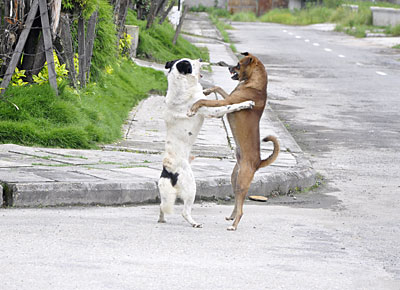 GYANENDRA KARKI CONSENSUS: Two canines talk it over in Singhadurbar |
There are three dogs in my house. The oldest, smartest, and the smallest, a mongrel bitch, is called Jantari. Then there's two male bhote kukurs (Tibetan Mastiff): Rame, 3, and Pushe, 1.
Now, observant readers will note such a combination is a recipe for disaster. One female, two males. What's more, two males of the bhote variety, notorious for their moody aggression. And so it proved. Rame was lord of what little he surveyed, with Jantari a willing courtier, until brash Pushe came along. Rame could push Pushe the Pup around, but it was clear to us early on that Pushe would soon outgrow Rame. We hoped Pushe would accept Rame as his elder, or that Rame would gracefully abdicate with time. It was not to be.
Last week, after a series of minor squabbles, Pushe and Rame got into the worst brawl of their doggy lives. When they were finally separated, there was blood everywhere. Rame had a torn mouth and was limping. Pushe had swollen, bloodshot eyes and cuts on his flanks. Those trying to break up the fight got bites for their trouble, too. What's worse, the bhotes refused to make up. Another confrontation seemed imminent. What to do?
The doggy drama put me in mind of larger questions. What can one do when opposing forces refuse to acknowledge each other, other than as enemies, and continue to fight to the detriment of themselves and the wider polity? The analogy didn't seem so far-stretched applied to our own political games. Pushe and Rame were battling it out for dominance, focused solely on gaining the upper hand. Their owners, instead of feeling secure in the knowledge that two strong and trustworthy employees were guarding the household, worried about their own security as they observed the snarling and growling from a distance.
Wild dogs, who live in highly organised packs attuned to collective survival, quickly find a way to adapt to hierarchical shuffles and get on with more important matters like procuring food. House dogs on the other hand, due to the idiosyncrasies of their breeding and owners, may take things rather more personally. So they persist in savaging each other, causing everyone around grief. Food still comes in a bowl day in day out, after all, so they can remain focused on egoistic struggles.
Back home, after some consultations, the momentous decision was taken to castrate both Pushe and Rame, that is, khasi banaune. We'd been told this might mean reduced male-to-male aggression, while not impairing the dogs' ability to guard the household. They would even put on weight, the vet suggested, which wasn't a bad thing at all as long as we made sure they weren't overeating. And of course, Jantari and her owners could rest easy whenever she came into heat �" the boys would simply continue in their disinterested service of the household.
We're still awaiting the results of the kindest cut. If all goes well, our household and its dogs will forge ahead in security and prosperity. So I'm sorely tempted to suggest a similar solution for our political gladiators. Oh, I wouldn't be so vulgar as to suggest literally castrating the men who sit there snarling in committees ad nauseam while the janata look on helplessly. A symbolic self-castration of ego, though, would go a long way in resolving the impasse they have brought us to. Collective egoism in the form of jingoism, too, could be dispensed with either side of the border. What's it good for?
Just as an aside, however, I have been reading up on eunuchs of late. In many cultures across this wonderful world of ours, castrated men appear to have occupied significant roles in the courts of the good and the great. Eunuchs, being unable to propagate, were often considered more trustworthy and less driven by personal gain, at least from a dynastic point of view. For my part, I'd like to dedicate this column to the Chinese eunuch Cai Lun (ca. 50-121AD), the patron saint of paper-making.



